Media & Resources
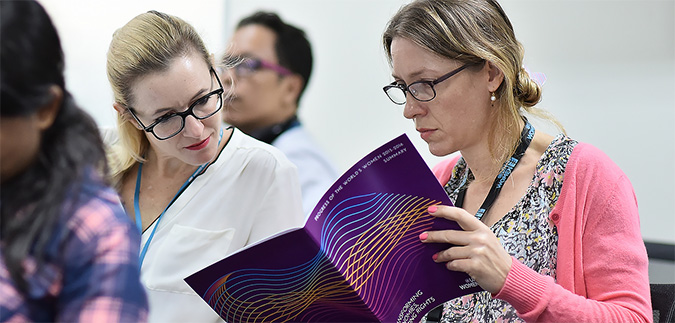
Country Briefs on HIV and Key Affected Women and Girls in ASEAN. Asian Foundation, UN Women, UNAIDS, UNZIP the Lips Platform, et al. (2013)
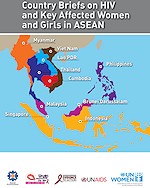 The briefs are intended as a resource for policymakers in Member States of the Association of Southeast Asian Nations (ASEAN), as well as planners, programme managers, health professionals, service providers, civil society organizations, including key population networks, women’s rights organizations, and others who are advocating for the needs and rights of key affected women and girls. It is hoped that key affected women and girls in each country will be able to use the country briefs to advocate on their own behalf, as well as in partnership with women’s rights groups, key population networks and human rights advocates for the information and services to which they are entitled under international health and human rights standards.
The briefs are intended as a resource for policymakers in Member States of the Association of Southeast Asian Nations (ASEAN), as well as planners, programme managers, health professionals, service providers, civil society organizations, including key population networks, women’s rights organizations, and others who are advocating for the needs and rights of key affected women and girls. It is hoped that key affected women and girls in each country will be able to use the country briefs to advocate on their own behalf, as well as in partnership with women’s rights groups, key population networks and human rights advocates for the information and services to which they are entitled under international health and human rights standards.
| Introduction | |
| Brunei Darussalam | Cambodia |
| Indonesia | Lao PDR |
| Malaysia | Myanmar |
| Philippines | Singapore |
| Thailand | Viet Nam |
-------------------------------------------------------------------
Enhancing the capacity of women to cope with climate change: Empowering Grassroots women to cope with natural disasters
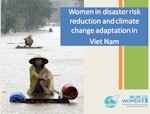 “Viet Nam is among one of the countries in the world that are seriously affected by the adverse effects of climate change, especially in coastal and low-land regions. In countries, where gender discrimination is tolerated, women and girls are particularly vulnerable. Women are often overburdened with productive and reproductive responsibilities thus they have less time to acquire new skills and awareness to cope with natural disasters. Women also have fewer opportunities to mobilize resources for disaster preparedness and rehabilitation. Livelihoods of many women are dependent on environmental and climatic conditions. Female headed households tend to be among those with least resilience. In addition, domestic and sexual violence tends to increase following a natural disaster. more
“Viet Nam is among one of the countries in the world that are seriously affected by the adverse effects of climate change, especially in coastal and low-land regions. In countries, where gender discrimination is tolerated, women and girls are particularly vulnerable. Women are often overburdened with productive and reproductive responsibilities thus they have less time to acquire new skills and awareness to cope with natural disasters. Women also have fewer opportunities to mobilize resources for disaster preparedness and rehabilitation. Livelihoods of many women are dependent on environmental and climatic conditions. Female headed households tend to be among those with least resilience. In addition, domestic and sexual violence tends to increase following a natural disaster. more
-----------------------------------------------------------------------
Migration Pop-up Stand
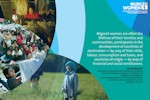 Migration women are often the lifelines of their families and communities, participants in the development of countries of destinations - by way of their skills, labour, consumption and taxes, and countries of origin - by way of financial and social remittances. - Michelle Bachellet, Under-Secretary-General and Executive Director, UN Women.
Migration women are often the lifelines of their families and communities, participants in the development of countries of destinations - by way of their skills, labour, consumption and taxes, and countries of origin - by way of financial and social remittances. - Michelle Bachellet, Under-Secretary-General and Executive Director, UN Women.
-----------------------------------------------------------------------
Perceptions and Attitudes of Young People on Issues Related to Violence against Women and Girls
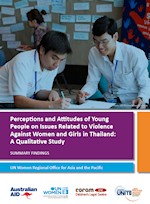 In 2012, UN Women Regional Office for Asia and the Pacific completed a multi-country research project to strengthen the evidence base on key areas of VAW, made possible by support from AusAID. As part of this project, national studies on the perceptions and attitudes of young people on issues related to VAW were undertaken in Lao PDR and Thailand.
In 2012, UN Women Regional Office for Asia and the Pacific completed a multi-country research project to strengthen the evidence base on key areas of VAW, made possible by support from AusAID. As part of this project, national studies on the perceptions and attitudes of young people on issues related to VAW were undertaken in Lao PDR and Thailand.
This research provided important insights required for evidence-based advocacy for greater government commitment to VAW prevention and response, and will inform the formulation of legislation, policies (NAPS) and programmes.
- In Thailand (753KB - pdf)
- In Lao PDR (808KB - pdf)
-----------------------------------------------------------------------
- Commission on the Status of Women (CSW) (606KB - pdf)
- Preventing and responding to violence against women and girls in Asia and the Pacific (4MB - pdf)
Related link:
-----------------------------------------------------------------------
Timeline: Gender Equality, 2012 Year in Review
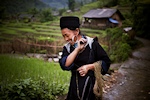 From the ratification of a United Nations convention on domestic worker rights to landmark laws on harassment to the conviction of a former president for war crimes, this timeline is a snapshot of some of the gender equality achievements in 2012.
From the ratification of a United Nations convention on domestic worker rights to landmark laws on harassment to the conviction of a former president for war crimes, this timeline is a snapshot of some of the gender equality achievements in 2012.
-----------------------------------------------------------------------
Annual Report
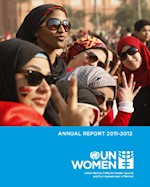 The Annual Report documents UN Women’s work to foster women’s empowerment and gender equality around the world. It highlights some of the organization’s initiatives during the year and provides summary financial statements, a list of new programmes and projects, and contact information.
The Annual Report documents UN Women’s work to foster women’s empowerment and gender equality around the world. It highlights some of the organization’s initiatives during the year and provides summary financial statements, a list of new programmes and projects, and contact information.
Editions Available
-----------------------------------------------------------------------
Do Our Laws Promote Gender Equality? - A Handbook for CEDAW-based Legal Reviews
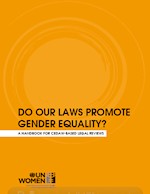 A Handbook for CEDAW-Based Legal Reviews is a user-friendly guide for reviewing laws to identify whether they discriminate against women. Using the Convention on the Elimination of all Forms of Discrimination against Women (CEDAW) as a framework, this handbook specially developed from experience in Southeast Asia, but applicable globally, takes you step-by-step through the process of measuring CEDAW compliance in national laws. From planning to carrying out a legal review, with advice to maximize your success along the way, this handbook shows government, NGOs, academics and practitioners working towards gender equality how to formulate CEDAW-based legal indicators, identify discriminatory provisions and gaps using these indicators, develop recommendations and use your CEDAW-based legal review to advocate for changes in law for gender equality. This document is available in English, Bahasa Indonesia, Laos, Khmer and Vietnamese. Read more...
A Handbook for CEDAW-Based Legal Reviews is a user-friendly guide for reviewing laws to identify whether they discriminate against women. Using the Convention on the Elimination of all Forms of Discrimination against Women (CEDAW) as a framework, this handbook specially developed from experience in Southeast Asia, but applicable globally, takes you step-by-step through the process of measuring CEDAW compliance in national laws. From planning to carrying out a legal review, with advice to maximize your success along the way, this handbook shows government, NGOs, academics and practitioners working towards gender equality how to formulate CEDAW-based legal indicators, identify discriminatory provisions and gaps using these indicators, develop recommendations and use your CEDAW-based legal review to advocate for changes in law for gender equality. This document is available in English, Bahasa Indonesia, Laos, Khmer and Vietnamese. Read more...
-----------------------------------------------------------------------
Progress of the World’s Women
Editions Available
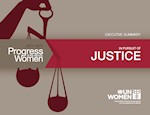 Progress of the World’s Women: In Pursuit of Justice (2011)
Progress of the World’s Women: In Pursuit of Justice (2011)- Progress of the World’s Women 2008/2009: Who Answers to Women? (2008)
- Progress of the World’s Women 2005: Women, Work & Poverty (2005)
- Women, War, Peace: The Independent Experts’ Assessment on the Impact of Armed Conflict on Women and Women’s Role in Peace-Building (Progress of the World’s Women 2002, Vol. 1) (2002)
- Progress of the World’s Women 2002, Volume 2: Gender Equality and the Millennium Development Goals (2002)
- Progress of the World’s Women 2000 (2000)
-----------------------------------------------------------------------
World Survey on the Role of Women in Development
- 2009: Women’s Control over Economic Resources and Access to Financial Resources, including Microfinance
- 2004: Women and International Migration
- 1999: Globalization, Gender and Work
- 1994: Women in a Changing Global Economy
- 1989: World Survey on the Role of Women in Development
- 1984: World Survey on the Role of Women in Development: Report of the Secretary-General
-----------------------------------------------------------------------

